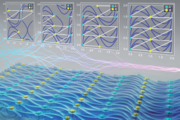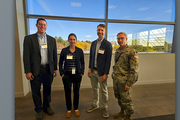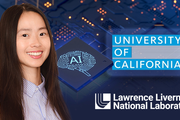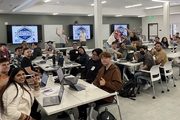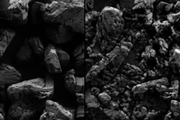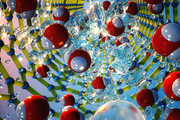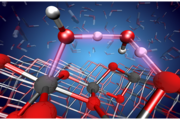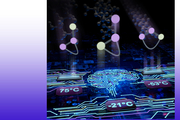Did you know we have a monthly newsletter? View past volumes and subscribe.
Machine learning tool fills in the blanks for satellite light curves
Feb. 13, 2024 -
When viewed from Earth, objects in space are seen at a specific brightness, called apparent magnitude. Over time, ground-based telescopes can track a specific object’s change in brightness. This time-dependent magnitude variation is known as an object’s light curve, and can allow astronomers to infer the object’s size, shape, material, location, and more. Monitoring the light curve of...
Will it bend? Reinforcement learning optimizes metamaterials
Dec. 13, 2023 -
Lawrence Livermore staff scientist Xiaoxing Xia collaborated with the Technical University of Denmark to integrate machine learning (ML) and 3D printing techniques. The effort naturally follows Xia’s PhD work in materials science at the California Institute of Technology, where he investigated electrochemically reconfigurable structures. In a paper published in the Journal of Materials...
Lab partners with new Space Force Lab
Nov. 14, 2023 -
LLNL subject matter experts have been selected by the U.S. Space Force to help stand up its newest Tools, Applications, and Processing (TAP) laboratory dedicated to advancing military space domain awareness (SDA). The Livermore team attended the October 26 kickoff in Colorado Springs of the SDA TAP lab’s Project Apollo technology accelerator, designed with an open framework to support and...
Data Days brings DOE labs together for discussions on data management and more
Nov. 9, 2023 -
Data researchers, developers, data managers, and program managers from the DOE national laboratories visited LLNL on October 24–26 to discuss the latest in data management, sharing, and accessibility at the 2023 DOE Data Days (D3) workshop. Sponsored by the National Nuclear Security Administration’s (NNSA) Office of Defense Nuclear Nonproliferation and hosted annually by LLNL, the event...
LLNL, University of California partner for AI-driven additive manufacturing research
Sept. 27, 2023 -
Grace Gu, a faculty member in mechanical engineering at UC Berkeley, has been selected as the inaugural recipient of the LLNL Early Career UC Faculty Initiative. The initiative is a joint endeavor between LLNL’s Strategic Deterrence Principal Directorate and UC national laboratories at the University of California Office of the President, seeking to foster long-term academic partnerships and...
UC Merced & UC Riverside tackle Data Science Challenge on ML-assisted heart modeling
Aug. 3, 2023 -
For the first time, students from the University of California (UC) Merced and UC Riverside joined forces for the two-week Data Science Challenge (DSC) at LLNL, tackling a real-world problem in machine learning (ML)-assisted heart modeling. Held in the Livermore Valley Open Campus’s newly remodeled University of California Livermore Collaboration Center from July 10-21, the event brought...
Explainable artificial intelligence can enhance scientific workflows
July 25, 2023 -
As ML and AI tools become more widespread, a team of researchers in LLNL’s Computing and Physical and Life Sciences directorates are trying to provide a reasonable starting place for scientists who want to apply ML/AI, but don’t have the appropriate background. The team’s work grew out of a Laboratory Directed Research and Development project on feedstock materials optimization, which led to...
Machine learning reveals refreshing understanding of confined water
July 24, 2023 -
LLNL scientists combined large-scale molecular dynamics simulations with machine learning interatomic potentials derived from first-principles calculations to examine the hydrogen bonding of water confined in carbon nanotubes (CNTs). They found that the narrower the diameter of the CNT, the more the water structure is affected in a highly complex and nonlinear fashion. The research appears on...
Consulting service infuses Lab projects with data science expertise
June 5, 2023 -
A key advantage of LLNL’s culture of multidisciplinary teamwork is that domain scientists don’t need to be experts in everything. Physicists, chemists, biologists, materials engineers, climate scientists, computer scientists, and other researchers regularly work alongside specialists in other fields to tackle challenging problems. The rise of Big Data across the Lab has led to a demand for...
Patent applies machine learning to industrial control systems
May 8, 2023 -
An industrial control system (ICS) is an automated network of devices that make up a complex industrial process. For example, a large-scale electrical grid may contain thousands of instruments, sensors, and controls that transfer and distribute power, along with computing systems that capture data transmitted across these devices. Monitoring the ICS network for new device connections, device...
Computing codes, simulations helped make ignition possible
April 6, 2023 -
Harkening back to the genesis of LLNL’s inertial confinement fusion (ICF) program, codes have played an essential role in simulating the complex physical processes that take place in an ICF target and the facets of each experiment that must be nearly perfect. Many of these processes are too complicated, expensive, or even impossible to predict through experiments alone. With only a few...
Fueling up hydrogen production
April 3, 2023 -
Through machine learning, an LLNL scientist has a better grasp of understanding materials used to produce hydrogen fuel. The interaction of water with TiO2 (titanium oxide) surfaces is especially important in various scientific fields and applications, from photocatalysis for hydrogen production to photooxidation of organic pollutants to self-cleaning surfaces and biomedical devices. However...
From plasma to digital twins
March 13, 2023 -
LLNL's Nondestructive Evaluation (NDE) group has an array of techniques at its disposal for inspecting objects’ interiors without disturbing them: computed tomography, optical laser interferometry, and ultrasound, for example, can be used alone or in combination to gauge whether a component’s physical and material properties fall within allowed tolerances. In one project, the team of NDE...
New HPC4EI project to create 'digital twin' models for aerospace manufacturing
Jan. 19, 2023 -
A partnership involving LLNL aimed at developing “digital twins” for producing aerospace components is one of six new projects funded under the HPC for Energy Innovation (HPC4EI) initiative, the Department of Energy’s Office of Energy Efficiency and Renewable Energy announced. Sponsored by the HPC4Manufacturing (HPC4Mfg) Program, one of the pillars of HPC4EI, the collaboration between LLNL...
National Ignition Facility achieves fusion ignition
Dec. 13, 2022 -
The U.S. Department of Energy (DOE) and DOE’s National Nuclear Security Administration (NNSA) today announced the achievement of fusion ignition at LLNL—a major scientific breakthrough decades in the making that will pave the way for advancements in national defense and the future of clean power. On Dec. 5, a team at LLNL’s National Ignition Facility (NIF) conducted the first controlled...
ML model instantly predicts polymer properties
Nov. 30, 2022 -
Hundreds of millions of tons of polymer materials are produced globally for use in a vast and ever-growing application space with new material demands such as green chemistry polymers, consumer packaging, adhesives, automotive components, fabrics and solar cells. But discovering suitable polymer materials for use in these applications lies in accurately predicting the properties that a...
Understanding the universe with applied statistics (VIDEO)
Nov. 17, 2022 -
In a new video posted to the Lab’s YouTube channel, statistician Amanda Muyskens describes MuyGPs, her team’s innovative and computationally efficient Gaussian Process hyperparameter estimation method for large data. The method has been applied to space-based image classification and released for open-source use in the Python package MuyGPyS. MuyGPs will help astronomers and astrophysicists...
ESGF launches effort to upgrade climate projection data system
Oct. 5, 2022 -
The Earth System Grid Federation (ESGF), a multi-agency initiative that gathers and distributes data for top-tier projections of the Earth’s climate, is preparing a series of upgrades that will make using the data easier and faster while improving how the information is curated. The federation, led by the Department of Energy’s Oak Ridge National Laboratory in collaboration with Argonne and...
LLNL to cooperate with University of Utah's one oneAPI Center of Excellence
Sept. 21, 2022 -
The University of Utah has announced the creation of a new oneAPI Center of Excellence focused on developing portable, scalable and performant data compression techniques. The oneAPI Center will be headed out of the University of Utah’s Center for Extreme Data Management Analysis and Visualization (CEDMAV) and will involve the cooperation of LLNL’s Center for Applied Scientific Computing. It...
An open-source, data-science toolkit for energy: GridDS
Aug. 2, 2022 -
As the number of smart meters and the demand for energy is expected to increase by 50% by 2050, so will the amount of data those smart meters produce. While energy standards have enabled large-scale data collection and storage, maximizing this data to mitigate costs and consumer demand has been an ongoing focus of energy research. An LLNL team has developed GridDS—an open-source, data-science...


